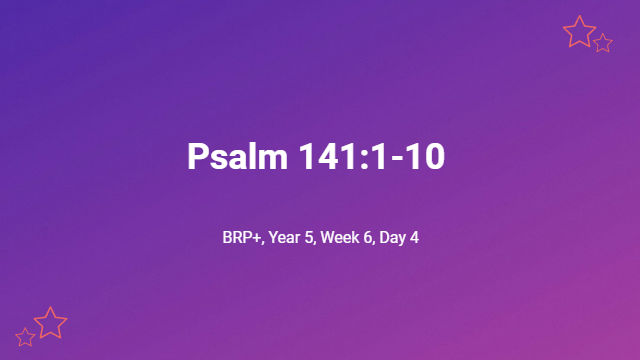Psalm 141:1-10
Q.1. What did David identify as a major stumbling block to godliness? What negative and positive ways did he deal with this threat? How did he present his prayer to God? – (Ps.141:1-6)
David was afflicted by thoughts of his poor use of words. He sought help from God and asked that the Lord may accept his petitions as a fragrant incense before Him. His first request was – Set a guard, O Lord, over my mouth; Keep watch over the door of my lips (Ps.141:3). David had come to the same conclusion as James did later – For we all stumble in many ways. If anyone does not stumble in what he says, he is a perfect man … (Jms.3:2). David knew that he needed divine assistance to help him use his tongue constructively. He also sought protection over his heart – Do not incline my heart to any evil thing, to practice deeds of wickedness with men who do iniquity; And do not let me eat of their delicacies (Ps.141:4). How often we can let down our guard, by following the examples of the ungodly, and by longing for the advantages from doing life in the world’s ways. David was the king. Such a high position had its own inbuilt temptation to refuse the correction from those around him. He prayed further – Let the righteous smite me in kindness and reprove me; It is oil upon the head; Do not let my head refuse it (Ps.141:5). As people sang this Psalm composed by the king, the example of his attitude to correction would fortify their relationships with each other, and with God.
Q.2. What was David’s determination? How special was God to the Psalmist? What was his prayer for the wicked? – (Ps.141:6-10)
David wanted his rule to stand out from those around. He wanted people to recognise that Israel’s king spoke words that were pleasant and just. His enemies lived and died by the sword. However, David he and his people had a different focus – For my eyes are toward You, O God, the Lord; In You I take refuge; do not leave me defenceless (Ps.141:8). The Lord meant everything to David. He trusted in and constantly looked to God for his protection from his own sinful nature, and from his enemies. His prayer for the wicked was that they might fall into their own traps, and learn that disobedience to God does not pay, as David had himself had found.

